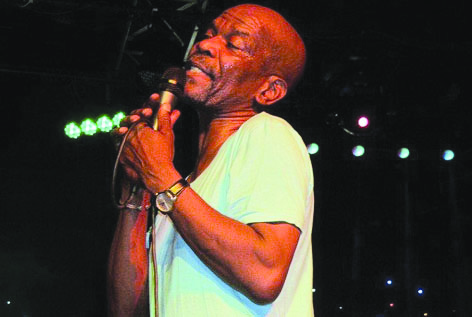


Last week Ray Phiri talked about his take on the business of music in South Africa. This week he talks about his personal and professional life including losing his wife to an accident, raising his children, his inspiration, his collaborative works with Sipho ‘Hotstix’ Mabuse, Tuku and his band Stimela’s role on Paul Simon’s controversial Graceland Tour.
 His musical beginnings
His musical beginnings
My father, Kanyama Phiri was a guitarist until he lost his fingers. He went into depression. I took up playing after him and I taught myself to play after buying a chord book. When I started, I was an instrumentalist. I played guitar. We had a band called the Cannibals. We backed Mparanyana (a famous vernacular soul singer) until he died and then I took up singing. People were thinking that we were finished but I asked how that could be since the person who had been writing the songs was still alive and that was me. I have also written songs for Sipho ‘Hotstix’ Mabuse among others. When we started, music was not about money though. We played out of passion. We never knew about royalties. Maybe what helped us was that the first black record label was called Mavutela Music run by Richard Bopape. We could earn something like 25 rand per concert. Bopape may not have been educated but he was smart and he taught us to save. I think that has kept us going as a group. We have discipline and we have been together as a team for the past 33 years.
On the Graceland Tour Circa 1987 and the controversy
The controversy surrounding Graceland was ‘created’. There was no cultural boycott that was busted. If working with South Africans meant that you had busted the cultural boycott, then he did. I would never have worked with Paul Simon if I thought he wanted to exploit us. We used him. We used each other. It was an opportunity to sensitise the world about the apartheid regime. We managed to bring the world’s attention to the apartheid monster. Simon made the approach after having worked with other South African musicians fruitlessly. I wrote some of the music. Songs are made up of two things: melody and lyrics. But I am credited as an arranger on the album. But we achieved our goals.
On the controversy
I was telling Dali Tambo (scion of the Tambo family and ANC stalwart) in London, “You are victimising us twice by refusing us the opportunity to speak to the world when the apartheid government is persecuting us.” He then said that Paul Simon should have gone and asked permission from the ANC. The whole thing fizzled out though and we ended up touring the world with Bra Hugh and Miriam Makeba on the tour.
Working with Paul Simon (former half of pop duo Simon and Garfunkel and writer of Bridge of Troubled Waters)
One thing I can commend him for, is his choice of lyrics and what to talk about. Paul is well read. He reads a lot of medieval books. He is deep like that. Paul is a thinker, a very shrewd person. Before he opens his mouth, he thinks a lot. You never know whether he is arrogant or undermining the other person because he says things in a way he talks about stuff. For example, in a song on Graceland he sings: ‘There is a girl in New York city who calls herself a human trampoline’. The song was caustically about his former wife Carrie Fisher. So maybe it’s his New York sense of humour.
Jamming for West Nkosi and helping to build Tuku Music
I played a role in the creation of Tuku Music. We used to go to Harare where there was Radio One. It had four tracks and West Nkosi would invite me to the sessions in Harare then Salisbury. I spent a lot of time shuttling into this country but did not actually live here. Then producer West Nkosi (of the then Gallo now Gramma) would record the music and we would go back to South Africa and dissect it. If you look at Tuku’s music it has a very South African music influence. It was the session band that would record Tuku’s music in the studio recordings and then West Nkosi would have him down in Joburg to record alone. Bakhithi Khumalo would play bass and Isaac Mtshali would play drums adding an mbaqanga/smanje smanje feel. If you ask him and he is honest, he will confirm this. If you listen to the very first albums of Oliver Mtukudzi you will hear that that was my guitar work but I am not credited because the idea was to build the Black Spirits and we were just sessionists for hire. The Black Spirits of the ‘70s were the very first successful recording group. The Elisha Josamus we also worked with them and would take those guys and record them. Even the Bundu Boys when they went out there, we would assist them.
On Thomas Mapfumo’s music
The music is very safe. I have heard Ndangariro and other albums. The lyrics are very strong and the music is very safe. But it can be be more. One thing I have realised about traditional music is that it’s kept at the folk level. Once you don’t want to experiment then the music doesn’t grow. But there is one Zimbabwean guy who is amazing in my opinion. The one who did Shamwari, Louis Mhlanga. He can be great. There are also other people I think are great. Dorothy Masuka is a legend. She gave so much to her art. She was born a cultural emissary. She wrote some of the songs that made Miriam Makeba. Though she is ailing now but her spirit is still strong.
Losing his religion
I stopped going to church in 1964. I used to go to church. I treat God as infinite. But just because you haven’t experienced my truth doesn’t make it a lie. I was a Catholic and I was punished on Monday after having confessed to the priest on Sunday. I said, ‘how can a human being punish me for what I had confessed to God?’ I have taught my kids to never ask me to go church. But I don’t stop them
Losing his wife and raising the babies alone
It was bad. My daughter is the one who saved me. She was seven months when we had the accident in 2003. I never went out for three years. I would hear her cry and I would be frantic to know who is hurting her. My daughter saved me because I focused entirely on her. Later on I remarried a widow also who helped me cope with the grief and my mum loved her as well as the kids and so we are still together.
Were you angry with God?
I was angry with myself to say if I hadn’t taken my wife along she might still be alive. The greatest love is to be alive. I have so much love inside of that I love another person and the feeling that you feel is great. That is why when I look at a woman and I say I am fond of you, no one cannot take it away from me. I love you for me.
On personal success
I achieved my dreams. I bought my mum a house amongst other things and she is now 107 years old. I didn’t go back to school but I am building one (Ray Phiri Institute of Arts). My children are well off. Three of my daughters have been to university. Two of them are running their own businesses. I think that music has made me a very wealthy person. Maybe not monetarily but spiritually. My children are better off than me.